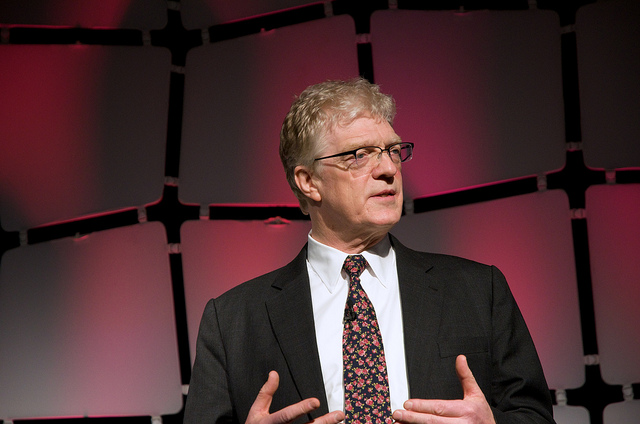Sir Ken Robinson, PhD is an internationally recognized speaker, writer, activist, and leader in the development of creativity and innovation. Robinson has given three presentations on the role of creativity in education at the prestigious TED Conference. His presentations have been viewed online over 34 million times. In fact, Robinson’s 2006 TED talk asking the question “Do Schools Kill Creativity?” is the most viewed presentation in the history of TED.
In 2011, Robinson was listed as “one of the world’s elite thinkers on creativity and innovation” by Fast Company magazine. He was also ranked among the Thinkers50 list of the world’s top business thought leaders. To top it all off, he was even knighted by the Queen in 2003 for services to art…go Sir Ken!
Pushing To Transform Education
What is it that’s got Ken Robinson so fired up? When asked to sum up his life’s mission in one sentence, Robinson said: “to transform the culture of education and organizations with a richer conception of human creativity and intelligence.” A lofty goal to be sure, but one arguably needed in today’s educational climate. In the U.S., we have a group of almost 2,000 high schools (commonly referred to as the “dropout factories”) that graduate less than 60% of their students.
Robinson believes that the current education system is an outdated relic of the industrial age. It was designed to produce workers and managers to support the old factory system. As a result, our schools don’t engage children in a way that produces the creativity and sense of curiosity needed to be successful in the information age.
Personalized Learning
Robinson recommends a highly personalized and individualized approach to teaching and learning. One that draws on today’s technological and professional resources to engage all students at their level. He wants to find and encourage individual talents.
Robinson believes the traditional “one-size-fits-all” model doesn’t cut it today. In his book, Creative Schools: The Grassroots Revolution That’s Transforming Education, Robinson says “our kids are living in a world of immense changes, of growing complexity, of growing interconnection, and we therefore have to ask ourselves what sort of education do our children need to flourish in this world.”
According to Robinson there are three principles that cause human life to flourish;
- We are all different and diverse, and have unique talents to offer the world.
- Curiosity.
- Creativity.
Do Schools Breed Conformity?
Robinson believes the current educational system is too rigid and linear to spark the type of diversity and creativity needed to produce innovative thinkers. Schools today, with their focus on standardized testing, tend to reward conformity and avoid risk-taking.
“All students start their school careers with sparkling imaginations, fertile minds, and a willingness to take risks with what they think,” he says. But then “most students never get to explore the full range of their abilities and interests…and it’s killing their motivation to learn.”
In a test-heavy environment, students are afraid to try new approaches for fear they will make mistakes or be “wrong”. They also tend to focus on core test subjects, even if their talents and aptitudes lie in other fields.
Robinson wants take conformity out of classrooms. He wants to eliminate rigid timetables and the grouping of students based solely on age. Robinson also wants to eliminate the hierarchy of subjects that puts things like math and science at the top, and physical education and the arts at the bottom. He would throw out the entire concept of “subjects” all together if he could.
Change The Status-Quo
“The idea of separate subjects that have nothing in common offends the principle of dynamism.” Instead, Robinson (and others in the field of education) propose broad cross-curriculum themes; such as understanding English communication and languages, or physical education and well being. He wants to educate the “whole child”, and help kids make connections between disciplines. Robinson advocates for the complete transformation of the education system.
If the popularity of his books and Ted talks are any indication, his message on embracing creativity is striking a chord with teachers and parents alike. But while it may be a popular message, Robinson and his proponents would argue we have a long way to go in practice. Standardized testing and subject-based curriculum are still the norm in most public schools.
Want to learn more about Sir Ken Robinson and his hopes for the future of education?
Robinson’s TED Talk Videos:
What do you think about Ken Robinson’s ideas? Share your thoughts and comments in our Education Community.












